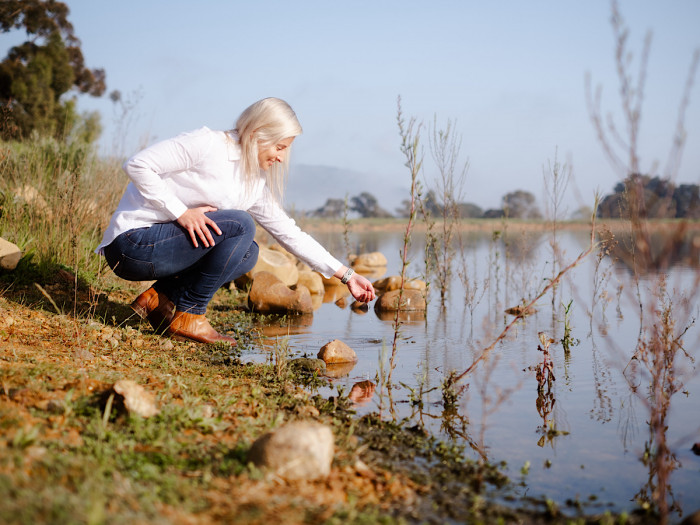News
A Collection Of Restaurant, Food, Drink And Hospitality News From All Over South Africa
Nederburg Saving Thousands Of Cubic Metres Of Water Annually
19 September 2025
In what might well be a first for the South African wine industry, Nederburg, owned by HEINEKEN Beverages, has created its own closed-loop vineyard, cellar and brand-home irrigation water supply, reducing its reliance on the municipal water grid. The result is not only an annual saving of 45 000 cubic metres of water, but also higher grape yields and improved fruit quality.
Isabel Teubes, Nederburg’s viticulturist says the investment in the new automated biological wastewater treatment technology is helping to boost the self-sufficiency of the famous Paarl winery, as well as its climate resilience. And should it become necessary, she says, it could increase its land planted to vineyards by 8% without having to increase its water consumption by a drop.
Biological wastewater treatment uses micro-organisms, in this case a combination of bacteria, to break down organic and certain inorganic matter. The bacteria consume organic pollutants in the wastewater as their food source, converting them into new cells, carbon dioxide, and water.
The locally developed, trademarked technology used by Nederburg has been in place since January 2024. Highly cost-effective, it uses no additional electricity, making it an essential tool in meeting HEINEKEN’s goal of achieving carbon neutrality. It also requires no filtration or use of membranes.
Essentially, the biological wastewater treatment involves a round-the-clock release of 43 specifically sequenced bacteria strains into the Nederburg cellar’s effluent water. The special microbial mix breaks down particulate organic matter and even metallic and other inorganic matter and absorbs dissolved organic matter as well as inorganic forms of nitrogen and phosphorus present in the water.
The precision-operated system continually recalibrates the concentration of the biological mix to cope with the fluctuating concentration of particulate matter in the water. This it treats and cleanses to human safety-grade drinking water standards exceeding South Africa’s Department of Water & Sanitation guidelines.
At this stage the treated water, fed into the winery’s network of seven dams on the farm, is used purely for vineyard and homestead garden irrigation and to clean all cellar equipment. Any overflow reaching the Berg River, she says, appears to have contributed to an improvement in riparian life, health and activity, and in the quality of the water itself.
“At the same time as we are improving the health of the local river, we are seeing the immensely positive impact of irrigation water quality on the health of our farm soils, their structure and water-holding capacity. In a trial conducted with two blocks of Chardonnay on the farm, cultivated in the same way, we saw a 50% increase in yield in the block irrigated with the treated water compared with the control block. And, if anything, fruit quality was in better fruit sugar and acid balance.
“Obviously we need to observe outcomes over several vintages for discernible patterns to emerge, but after over 20 months we can already see just how beneficial the bacteria-treated water is for the rhizosphere - the layer of soil surrounding the vine roots and where the vines release nutrients for the soil micro-organisms. Enhancing the bio-availability of nutrients is good for vine health and resistance to disease and to climate extremes.”
She adds that supplier-growers to Nederburg are now also adopting this technology, at the same time as a variety of Western Cape municipalities and other farming enterprises are poised to do so. “Given the mounting spectre of water scarcity in the Western Cape, all of us need to find more water-wise ways of farming.”
HEINEKEN’s agricultural specialist Henk van Graan, an adherent of regenerative farming for close to a decade, believes that more mindful water management is one of the essential steps in building soil life and health and biodiversity, as well as climate resilience.
“As we begin to appreciate the ecosystems of healthy soils, we are learning in more detail about how their microbial populations provide structural support for all types of plants. They help to fix nitrogen, aerate, moisturise and enrich the soil. Carbon compounds are released by plant roots into the soil to feed billions of organisms and cycle nutrients. As a result, aggregate habitat is created to play an important role in filtering, retaining, and draining water.”
Microbial communities also support carbon sequestration, using light energy converted into chemical energy (carbon compounds via root exudates) that is stored in the soil during photosynthesis.
To accelerate carbon sequestration and advance soil life through microorganisms, Van Graan has been generating biochar, the charcoal produced from plant matter (biomass). “When used as a soil additive, it not only removes carbon dioxide from the atmosphere, but it creates an environment conducive to boosting microbial populations while building soil structure, reducing soil acidity, and generally decontaminating the soil. Because it is so porous, it absorbs, retains, and aggregates water and increases organic soil life, ultimately lowering the need for inputs such as additional water and chemical fertilisers.”
An important feature of biochar is that it is recognised as carbon negative. It remains in a highly stable form in the soil, indefinitely, storing carbon potentially for hundreds if not thousands of years.
Van Graan mixes the biochar produced at Nederburg with compost derived from grape skins, stems, pips, as well as other organic waste on the farm, together with recycled water. The mix is then inoculated with nutrients and beneficial organisms.
He points out that Nederburg has also been a WWF Conservation Champion since 2020, recognised back then for its assiduous water stewardship. From water-saving irrigation techniques and cellar processes to land rehabilitation, it has made water management a central feature of its sustainability practices.
Nearly 30 years ago, the farm was also used to pilot the development of South Africa’s eco-friendly Integrated Production of Wine (IPW) protocols, now followed by almost the entire country’s wine industry.
The Manor Restaurant at Nederburg
Paarl, Western Cape Bistro, Breakfast, Cocktails, Country, Deli, Health, Light Meals, Picnics, Seafood, South African, Tapas, Vegetarian
Come to The Manor restaurant at Nederburg in Paarl, and be enticed by fragrances of cinnamon, star anise, cardamom, fresh ginger, rooibos, buchu and roasted nuts. Or wafts of real classics like hom...











